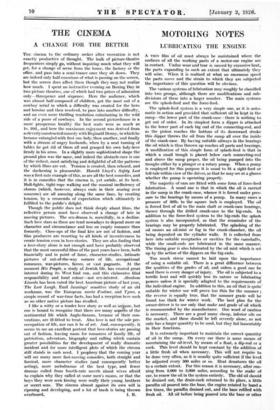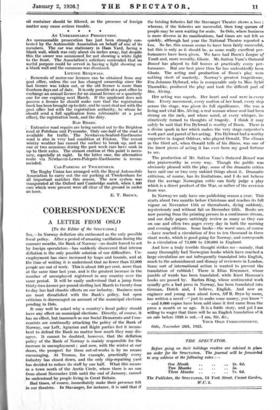MOTORING NOTES
LUBRICATING THE ENGINE
A Tnix film of oil must always be maintained where the surfaces of all the working parts of a motor-car engine are in contact. Undue wear and tear is caused by excessive heat, the parts expanding to such an extent that ultimately they will seize. When it is realized at what an enormous speed the parts move and the strain to which they are subjected the importance of this question will be obvious.
The various systems of lubrication may roughly be classified into two groups, although there are modifications and sub- divisions of these into a larger number. The main systems are the splash-feed and the force-feed.
The splash-feed system is a very simple one, as it is auto? matic in action and provided that sufficient oil be kept in the sump—the lower part of the crank-case—there is nothing to get out of order. In its simplest form a dipper is attached to the lower part of each big end of the connecting-rod, and as the piston reaches the bottom of its downward stroke this dipper throws the oil from the sump all over the inside of the crank-case. By having suitable oilways in the bearings the oil which is thus thrown up reaches all parts and bearings. A modification of this simple form_ of splash-feed is that in which a small trough is placed below each connecting-rod and above the sump proper, the oil being pumped into the troughs either by a plunger or a rotary pump. When a pump is employed for this purpose it is usual to fit a sight-feed or tell-tale within view of the driver, so that he may see at a glance whether the pump is operating properly.
The majority of cars are fitted with some form of force-feed lubrication. A usual one is that in which the oil is carried in the sump in the crank-case, whence it is forced under pres- sure to the bearings by means of a pump. In many cases a pressure of 301b. to the square inch is employed. The oil is forced first of all to the main shaft or crank-case bearings, thence through the drilled crank-case to the big-ends. In addition to the force-feed system to the big-ends the splash system is also incorporated, so that the remainder of the bearings may be properly lubricated. The splashing of the oil causes an oil-mist or fog in the crank-chamber, the oil being deposited on the cylinder walls. It is collected from here into suitable receptacles or cavities for the camshafts, while the small-ends are lubricated in the same manner. The timing gear is also lubricated by the oil mist which is set up by the action of the dippers on the big-ends.
Too much stress cannot be laid upon the importance . of using a suitable oil. There is a great difference between the qualities of the grades of oil, and unless a good one be used there is every danger of injury. The oil is subjected to a terrific heat and will quickly lose its nature or lubricating powers unless it is specially adapted to the requirements of the individual engine. In addition to this, an oil that is quite' suitable for winter use will prove too thin for the summer ; the reverse is equally true, that the summer grade will be found too thick for winter work. The best plan for the owner-driver is to use only that make and grade of oil which is recommended by the manufacturer. One word of caution is necessary. There are a good many cheap, inferior oils on the market, and these should be left severely alone, as not • only has a larger quantity to be used, but they fail lamentably in their functions. It is extremely important to maintain the correct quantity • of oil in the sump. On every car there is some means of ascertaining the oil-level, by means of a float, a dip-rod or a cock. This level should be kept constant by the addition of a little fresh oil when necessary. This will not require to be done very often, as it is usually quite sufficient if the level be adjusted every 500 miles or so. Heat denatures the oil to a certain extent. For this reason it is necessary, after run- ning from 2,000 to 3,000 miles, according to the make of car, to renew the oil in the system entirely. The old oil should be drained out, the drain-cock returned to its place, a little paraffin oil poured into the base, the engine rotated by hand a few times, the paraffin drained out, and the base refilled with fresh oil. All oil before being poured into the base or other oil container should be filtered, as the presence of foreign matter may cause serious trouble.
AN UNREASONA.BLE PROSECUTION.
AN unreasonable prosecution has just been strongly con- tested by the Automobile Association on behalf of one of its members. The car was stationary in Ham Yard, facing a blank wall, which was only about six inches away, but despite this the owner was summoned for not showing a white light to the front. The Association's solicitors contended that no useful purpose could be served in having a light showing on a blank wall and the summons was dismissed.
LICENCE RENWALS.
, Renewals of motor-ear licences can be obtained from any post office, unless the car has changed ownership since the 'last licence was taken out, or the old licence is more than 'fourteen days out of date. It is only possible at a post office to exchange an annual licence for an annual licence or a quarterly one for one expiring next March. If the applicant does not possess a licence he should make sure that the registration book has been brought up to date, and he must deal not with the ipost office but with the registration authority, to whom he should send a full application form, (obtainable at a post office), the registration book, and the duty.
Bu n ROADS.
Extensive road repairs are being carried out to the Brighton road at Patcham and Pyecombe. Only one-half of the road is available for traffic. The Newhaven-Seaford-Eastbourne Toad is also in very bad condition at Friston. The recent ;wintry weather has caused the surface to break up, and on one or two occasions during the past week cars have sunk in up to their axles. The utmost caution at this point is neces- sary, especially at night. In the latter case, the alternative route via Newhaven-Lewes-Polegate-Eastbourne is recom- mended.
CAR-PARKING AT TWICKENHAM.
The Rugby Union has arranged with the Royal Automobile Association to carry out the car parking at Twickenham for all important matches this season. The new system was inaugurated at the Oxford and Cambridge match, when 1,400 cars which were present were all clear of the ground in under an hour.
E. T. BROWN.











































 Previous page
Previous page